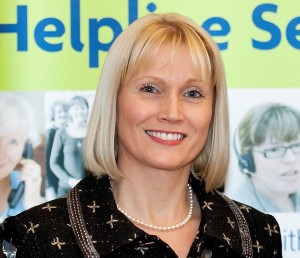 An estimated three million people in the UK have osteoporosis, and a recent survey of the National Osteoporosis Society’s members revealed that a fifth of women who have fractured bones sustain three or more breaks before being diagnosed.
An estimated three million people in the UK have osteoporosis, and a recent survey of the National Osteoporosis Society’s members revealed that a fifth of women who have fractured bones sustain three or more breaks before being diagnosed.
That must change and osteoporosis must be diagnosed sooner. At the National Osteoporosis Society, we believe that everyone over 50 who suffers a break should be assessed for osteoporosis. This is why we are setting out our ambition to increase the number of fracture liaison services across the UK.
A fracture liaison service (FLS) is a dedicated clinical service, which is usually delivered by a nurse specialist working within a hospital environment and under the guidance of a specialist in bone health. The fracture liaison nurse ensures that every person aged over 50 who has broken a bone (excluding high trauma and road traffic accident victims) receives a “one stop shop” osteoporosis assessment.
FLSs are an effective way of preventing people from future breaks as a result of osteoporosis: the first FLS in Glasgow reported a 7.3% decrease in hip fractures in the decade following its introduction, compared with a 17% increase in the same duration in England. Despite the evidence to suggest the service’s effectiveness, recent figures we have collected suggest there is only 44% coverage of FLSs across the UK.
FLSs have the potential to alleviate burden on the NHS as there are an estimated 89 000 hip fractures each year, and the combined cost of hospital and social care for patients with a hip fracture amounts to around £6mn a day. Not only this, but the service plays a crucial role in reducing the pain and suffering caused by osteoporosis, through identifying people at an earlier stage and preventing future breaks.
This month we launched a new FLS in partnership with Portsmouth Hospitals NHS Trust, which will act as a benchmark for our new national FLS delivery programme.
We are also supporting the growth and improvement of FLSs in the following ways:
- We are developing UK standards for FLS. Working with clinical experts and national groups, we are leading an expert authoring group to distil evidence based best practice.
- In the absence of robust methods of national data collection, we have built a picture of FLS provision in the UK through our regional staff and their local contacts.
- We are supporting a National Audit. Data in this area is vital to driving up standards and ensuring better patient outcomes.
- We are producing a toolkit for commissioners to enable localities to successfully fund and establish a FLS, underpinned with support from NHS England and Public Health England.
- We are developing an education programme for FLS staff, which will be the first accredited online training programme for FLS practitioners.
- We will drive up quality by piloting a peer review process for osteoporosis and metabolic bone services. This will asses FLSs where they are in place, and allow sites to gain an insight into their performance and areas for improvement.
- We will be encouraging MPs to lobby local clinical commissioning groups (CCGs) and health and wellbeing boards (HWBs) in their constituencies to commission an FLS.
In the meantime, as we help build FLS provision in the UK, we want to raise awareness among patients and doctors of osteoporosis and the risk of fragility fractures.
Claire Severgnini is CEO of the National Osteoporosis Society.
Competing interests: I, Claire Severgnini, declare that I have read and understood the BMJ policy on declaration of interests and I have no relevant interests to declare.
